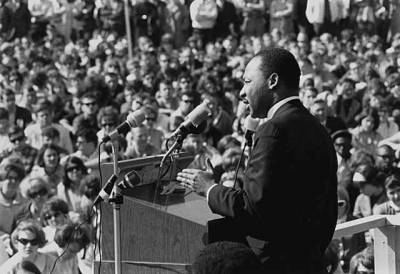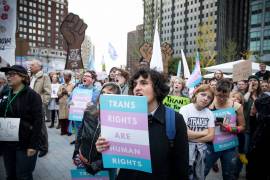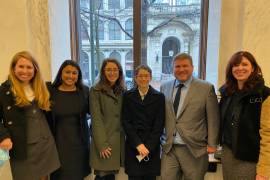
For MLK Day, Let's Remember That Voting Restrictions Are An LGBTQI+ Issue Too
Blog Search
By Kristine Kippins, Deputy Legal Director for Policy
"The denial of this sacred right is a tragic betrayal of the highest mandates of our democratic traditions and it is democracy turned upside down."—Martin Luther King, Jr., 1957
As we honor Dr. Martin Luther King, Jr. Day this year, it's critical that we not lose sight of one of the civil rights icon's most essential dreams: Our ability to have fair and equal access to vote in this country. In fact, Dr. King’s family has called for “no celebration” of MLK Day without passage of voting rights legislation.
But it seems as though there will be no celebration this year as Congress allows the attacks on this sacred constitutional right to continue. And yet, it is critical for Congress to act now because laws that restrict voting rights minimize the political power of LGBTQI+ people, especially those living at the intersection of marginalized communities, at a time when their rights are at stake and their political participation is needed most.
In 2013, the Supreme Court began its assault on voting rights when it handed down a disappointing and dangerous decision in Shelby County v Holder, which gutted critical protections established in the monumental 1965 Voting Rights Act. Before that ruling, if you lived in a jurisdiction with a history of voter suppression and discriminatory voting practices, your legislators couldn't change their election laws without getting “preclearance” (a.k.a. sign-off) from either a federal court or the U.S. Justice Department. However, now, that is no longer the case. Shelby County opened up the floodgates for states such as Georgia, Texas, and Florida to pass laws without preclearance to make it harder for young people, disabled people, seniors, transgender, non-binary, and BIPOC folks to cast our ballots. They have accomplished this by restricting early voting, imposing more burdensome identification requirements, and shutting down polling stations in predominantly Black neighborhoods. Even worse? Several more legislatures are expected to consider bills to suppress the right to vote this coming year.
This crop of unjust restrictions impacts LGBTQI+ people in a number of ways:
-
Due to slavery, Jim Crow, and hundreds of years of systematic racism, voter suppression disproportionately and historically disenfranchises Black voters and other voters of color. Looking at states in the South specifically, where many of these restrictive laws are being passed and where it is less likely for there to be state-level LGBTQ-inclusive laws and policies on the books (such as nondiscrimination protections), more than one-in-five LGBTQ Southerners is Black, essentially blocking their ability to select which lawmakers represent them in local, state, and federal government.
-
Laws requiring voters to present a photo ID that matches their gender identity restrict many transgender and gender-nonconforming people from voting, given how challenging it is for many to change their IDs. For states that require IDs, regardless of whether it matches one's gender identity, this can still cause stigma and discrimination in the polling station.
-
According to a 2019 HRC report, voter identification requirements prevented 24% of LGBTQ+ adults, 35% of LGBTQ+ people of color, 42% of transgender people from voting in at least one election in their lives. Moreover, 46% of transgender people of color said, they did not vote in one or more elections in their lives specifically because their ID had an incorrect gender marker, name, or photo. With 24 states restricting transgender and nonbinary people from legally updating their IDs to reflect their gender identity, this has a major impact on who shows up to the polls and who doesn't.
The U.S. House of Representatives has done its job, passing the full package of voting rights legislation that would make our elections safe and more accessible. While President Biden is calling for the Senate to do the same, we all must do our part too. Right now, you can contact your Senators and demand that they pass:
-
For the People Act: This legislation is a comprehensive package of voting, redistricting, and campaign finance reforms. Among other things, it would make Election Day a national holiday, require states to offer a minimum number of days of early voting, provide the ability to vote by mail for any reason, keep voting lines to 30 minutes or less, and increase penalties for intimidating and deceiving voters.
-
John Lewis Voting Rights Advancement Act: Named after the late Georgia civil rights leader and Congressman who encouraged us all to get into “good trouble,” this legislation would restore and strengthen the Voting Rights Act of 1965. It would ameliorate the disastrous impact of the Shelby County decision as well as expand and enforce the right to vote.
-
Washington D.C. Admission Act: This legislation would grant the nation's capital statehood, finally giving Washington, D.C. voting members in Congress. With more than 700,000 residents, D.C. has a disenfranchised population that is larger than Vermont or Wyoming. Ten percent of D.C.'s residents are LGBTQI+, denying a significant number of LGBTQI+ people the right to defend themselves from attacks at the federal level or protect their local laws from congressional interference.
With more than 100 anti-LGBTQI+ bills introduced in 35 states last year and at least 2 million unregistered —but eligible— LGBTQI+ voters, we cannot afford to be complacent. We've seen the impact our votes can have locally and federally, and we cannot sit and watch legislators in real-time work to diminish our collective political power.
Now is the time to honor MLK’s legacy, channel his tenacity and stand up to fight for our right to vote, our dignity, and most importantly, our lives.
To find your Senator and demand passage of the federal legislation mentioned here, go to: https://www.senate.gov/senators/senators-contact.htm
To see Lambda Legal’s Voting guide for TGNCNB people, visit: https://www.lambdalegal.org/vote




